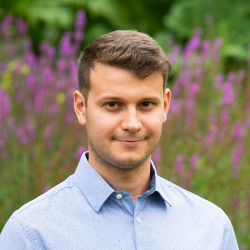
Dr Guillaume Rochette
Publications
We present a new approach for synthesizing novel views of people in new poses. Our novel differentiable renderer enables the synthesis of highly realistic images from any viewpoint. Rather than operating over mesh-based structures, our renderer makes use of diffuse Gaussian primitives that directly represent the underlying skeletal structure of a human. Rendering these primitives gives results in a high-dimensional latent image, which is then transformed into an RGB image by a decoder network. The formulation gives rise to a fully differentiable framework that can be trained end-to-end. We demonstrate the effectiveness of our approach to image reconstruction on both the Human3.6M and Panoptic Studio datasets. We show how our approach can be used for motion transfer between individuals; novel view synthesis of individuals captured from just a single camera; to synthesize individuals from any virtual viewpoint; and to re-render people in novel poses.
We present a novel data-driven regularizer for weakly-supervised learning of 3D human pose estimation that eliminates the drift problem that affects existing approaches. We do this by moving the stereo reconstruction problem into the loss of the network itself. This avoids the need to reconstruct 3D data prior to training and unlike previous semi-supervised approaches, avoids the need for a warm-up period of supervised training. The conceptual and implementational simplicity of our approach is fundamental to its appeal. Not only is it straightforward to augment many weakly-supervised approaches with our additional re-projection based loss, but it is obvious how it shapes reconstructions and prevents drift. As such we believe it will be a valuable tool for any researcher working in weakly-supervised 3D reconstruction. Evaluating on Panoptic, the largest multi-camera and markerless dataset available, we obtain an accuracy that is essentially indistinguishable from a strongly-supervised approach making full use of 3D groundtruth in training.